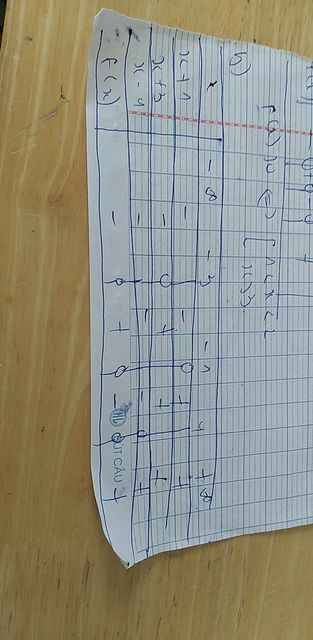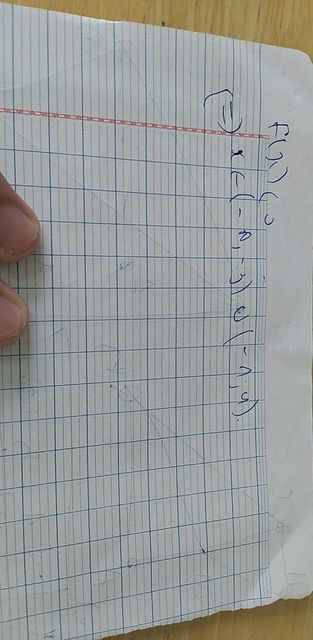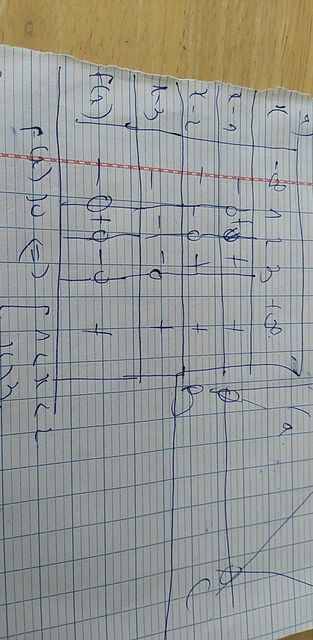Giải các phương trình sau: x 2 - 1 ( x + 2 ) ( x - 3 ) = ( x - 1 ) x 2 - 4 ( x + 5 )
Hãy nhập câu hỏi của bạn vào đây, nếu là tài khoản VIP, bạn sẽ được ưu tiên trả lời.


Mình khuyên bạn thế này :
Bạn nên tách những câu hỏi ra
Như vậy các bạn sẽ dễ giúp
Và cũng có nhiều bạn giúp hơn !
Bài 1.
a) ( x - 3 )( x + 7 ) = 0
<=> x - 3 = 0 hoặc x + 7 = 0
<=> x = 3 hoặc x = -7
Vậy S = { 3 ; -7 }
b) ( x - 2 )2 + ( x - 2 )( x - 3 ) = 0
<=> ( x - 2 )( x - 2 + x - 3 ) = 0
<=> ( x - 2 )( 2x - 5 ) = 0
<=> x - 2 = 0 hoặc 2x - 5 = 0
<=> x = 2 hoặc x = 5/2
Vậy S = { 2 ; 5/2 }
c) x2 - 5x + 6 = 0
<=> x2 - 2x - 3x + 6 = 0
<=> x( x - 2 ) - 3( x - 2 ) = 0
<=> ( x - 2 )( x - 3 ) = 0
<=> x - 2 = 0 hoặc x - 3 = 0
<=> x = 2 hoặc x = 3

\(a,\dfrac{x-3}{x}=\dfrac{x-3}{x+3}\)\(\left(đk:x\ne0,-3\right)\)
\(\Leftrightarrow\dfrac{x-3}{x}-\dfrac{x-3}{x+3}=0\)
\(\Leftrightarrow\dfrac{\left(x-3\right)\left(x+3\right)-x\left(x-3\right)}{x\left(x+3\right)}=0\)
\(\Leftrightarrow x^2-9-x^2+3x=0\)
\(\Leftrightarrow3x-9=0\)
\(\Leftrightarrow3x=9\)
\(\Leftrightarrow x=3\left(n\right)\)
Vậy \(S=\left\{3\right\}\)
\(b,\dfrac{4x-3}{4}>\dfrac{3x-5}{3}-\dfrac{2x-7}{12}\)
\(\Leftrightarrow\dfrac{4x-3}{4}-\dfrac{3x-5}{3}+\dfrac{2x-7}{12}>0\)
\(\Leftrightarrow\dfrac{3\left(4x-3\right)-4\left(3x-5\right)+2x-7}{12}>0\)
\(\Leftrightarrow12x-9-12x+20+2x-7>0\)
\(\Leftrightarrow2x+4>0\)
\(\Leftrightarrow2x>-4\)
\(\Leftrightarrow x>-2\)

\(a,\left(2x-3\right)\left(x^2-4\right)=0\\ \Leftrightarrow\left(2x-3\right)\left(x-2\right)\left(x+2\right)=0\\ \Leftrightarrow\left[{}\begin{matrix}x=\dfrac{3}{2}\\x=2\\x=-2\end{matrix}\right.\\ b,2x-\left(3-5x\right)=4\left(x+3\right)\\ \Leftrightarrow2x-3+5x=4x+12\\ \Leftrightarrow7x-3-4x-12=0\\ \Leftrightarrow3x-15=0\\ \Leftrightarrow x=5\)
\(c,ĐKXĐ:\left\{{}\begin{matrix}x\ne-1\\x\ne2\end{matrix}\right.\)
\(\dfrac{1}{x-2}-\dfrac{2}{x+1}=\dfrac{11-3x}{\left(x+1\right)\left(x-2\right)}\\ \Leftrightarrow\dfrac{x+1}{\left(x-2\right)\left(x+1\right)}-\dfrac{x-2}{\left(x+1\right)\left(x-2\right)}-\dfrac{11-3x}{\left(x+1\right)\left(x-2\right)}=0\\ \Leftrightarrow\dfrac{x+1-x+2-11+3x}{\left(x+1\right)\left(x-2\right)}=0\\ \Rightarrow3x-8=0\\ \Leftrightarrow x=\dfrac{8}{3}\left(tm\right)\)

a: \(\Leftrightarrow\left(4x+14\right)^2-\left(3x+9\right)^2=0\)
=>(4x+14+3x+9)(4x+14-3x-9)=0
=>(7x+23)(x+5)=0
=>x=-23/7 hoặc x=-5
\(a,\\ \Leftrightarrow7x^2+58x+115=0\\ \Leftrightarrow\left(x+5\right)\left(7x+23\right)=0\\ \Leftrightarrow\left\{{}\begin{matrix}x+5=0\\7x+23=0\end{matrix}\right.\Leftrightarrow\left\{{}\begin{matrix}x=-5\\x=-\dfrac{23}{7}\end{matrix}\right.\)
\(b,\\ \Leftrightarrow\left[\left(x+1\right)\left(x+5\right)\right]\left[\left(x+3\right)\left(x+4\right)\right]=0\\ \Leftrightarrow\left(x^2+6x+5\right)\left(x^2+6x+8\right)=0\\ \LeftrightarrowĐặt.x^2+6x+5=a\\ \Leftrightarrow a=a\left(a+3\right)=10\\ \Leftrightarrow a^2+3a-10=0\\ \Leftrightarrow\left(a+5\right)\left(a-2\right)=0\\ \Leftrightarrow\left[{}\begin{matrix}a=-5\\a=2\end{matrix}\right.\Rightarrow\left[{}\begin{matrix}x^2+6x+5=-5\\x^2+6x+5=2\end{matrix}\right.\\ \Leftrightarrow\left[{}\begin{matrix}x^2+6x+10=0\\x^2+6x+3=0\end{matrix}\right.\\ \left(Vô.n_o\Delta=36-40=-4< 0\right)\)
\(\Leftrightarrow\left[{}\begin{matrix}x=-3+\sqrt{6}\\x=-3-\sqrt{6}\end{matrix}\right.\)

1) \(\left|x-1\right|+\left|x-2\right|+\left|x-3\right|+\left|x-4\right|=5x-20\) (1)
Vì \(VT\ge0\) nên \(5x-20\ge0\) hay \(x\ge4\)
Do đó
\(\left|x-1\right|+\left|x-2\right|+\left|x-3\right|+\left|x-4\right|=x-1+x-2+x-3+x-4=4x-10\)
(1) tương đương với
\(4x-10=5x-20\) \(\Leftrightarrow x=10\) (Nhận)
Bài 2) tương tự

\(x-5=\frac{1}{3\left(x+2\right)}\left(đkxđ:x\ne-2\right)\)
\(< =>3\left(x-5\right)\left(x+2\right)=1\)
\(< =>3\left(x^2-3x-10\right)=1\)
\(< =>x^2-3x-10=\frac{1}{3}\)
\(< =>x^2-3x-\frac{31}{3}=0\)
giải pt bậc 2 dễ r
\(\frac{x}{3}+\frac{x}{4}=\frac{x}{5}-\frac{x}{6}\)
\(< =>\frac{4x+3x}{12}=\frac{6x-5x}{30}\)
\(< =>\frac{7x}{12}=\frac{x}{30}< =>12x=210x\)
\(< =>x\left(210-12\right)=0< =>x=0\)

\(a,4+3x=25-4x\\ \Leftrightarrow7x=21\\ \Leftrightarrow x=3\\ b,\left(x-1\right)^2+\left(x-1\right)\left(x+3\right)=0\\ \Leftrightarrow\left(x-1\right)\left(x-1+x+3\right)=0\\ \Leftrightarrow\left(x-1\right)\left(2x+2\right)=0\\ \Leftrightarrow\left[{}\begin{matrix}x-1=0\\2x+2=0\end{matrix}\right.\\ \Leftrightarrow\left[{}\begin{matrix}x=1\\x=-1\end{matrix}\right.\)
c, ĐKXĐ:\(x\ne-1,x\ne2\)
\(\dfrac{1}{x+1}+\dfrac{3}{x-2}=\dfrac{9}{\left(x+1\right)\left(x-2\right)}\\ \Leftrightarrow\dfrac{x-2}{\left(x+1\right)\left(x-2\right)}+\dfrac{3\left(x+1\right)}{\left(x+1\right)\left(x-2\right)}-\dfrac{9}{\left(x+1\right)\left(x-2\right)}=0\\ \Leftrightarrow\dfrac{x-2+3x+3-9}{\left(x+1\right)\left(x-2\right)}=0\\ \Rightarrow4x-8=0\\ \Leftrightarrow x=2\left(ktm\right)\)

Bài 3:
b: \(\Leftrightarrow x^2\left(x+1\right)^2=0\)
hay \(x\in\left\{0;-1\right\}\)
c: \(\Leftrightarrow\left(x-1\right)\left(x^2+x+1\right)=0\)
=>x-1=0
hay x=1
d: \(\Leftrightarrow6x^2-3x-4x+2=0\)
\(\Leftrightarrow\left(2x-1\right)\left(3x-2\right)=0\)
hay \(x\in\left\{\dfrac{1}{2};\dfrac{2}{3}\right\}\)




⇔ ( x - 1 )( x + 2 )( 7 - 5x ) = 0
Vậy phương trình có tập nghiệm là S = { - 2; 1; 7/5 }.